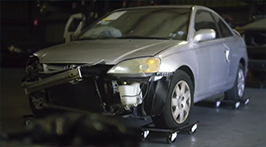Stair gates are a child safety feature used in many households to prevent small children from falling down stairs. There are many types of child safety gates available on the market, with some designed for use in stairways only or in doorways only. The Juvenile Products Manufacturers Association suggests that a stair gate be used as soon as motor skills such as crawling or squirming are evident in an infant. Stair gates are generally recommended for infants between 6 and 24 months of age, with higher gates recommended for older infants.
Defective Stair Gates
A stair gate can be defective if it is easily knocked down or removed by a child. In addition, the mounting hardware in a stair gate can break or become dismantled in defective products. A defective stair gate poses an extremely hazardous fall risk to a child, with many possible injuries or even death. In addition to a fall risk, defective stair gates in which hardware or other small parts become detached also present a choking hazard to infants.
Voluntary Standards for Stair Gates
While there are no federally mandated regulations for child safety gates in the U.S., the American Society for Testing and Materials has developed voluntary standards for expansion gates and expandable enclosures. These standards focus primarily upon height, size of openings, spacing at the bottom of the gate, upper edge configurations, and label warnings.
Injury and Death Statistics Related to Stair Gates
In 2008, the Consumer Product Safety Commission (CPSC) received a total of 2,200 injury reports involving a child safety stair gate. There were two reported deaths connected to child safety stair gates between 2004 and 2006, and one death reported between 2003 and 2005.
Defective Stair Gates Recalls
Examples of defective infant safety stair gates that have been recalled include:
-
Safety 1st SmartLight Stair Gates
In August 2009, the Dorel Juvenile Group USA, of Columbus, Indiana, expanded a previous recall on Safety 1st SmartLight Stair Gates due to a fall hazard. In February 2009, 100,000 units had been recalled. The expansion of the recall includes an additional 31,500 units with model number 42111. The hinges on the frame of the stair gate which hold it in place can break and become detached. The recalled gates are white metal with a motion detector nightlight and a gray handle. The stair gates were sold nationwide at juvenile product and mass merchandise stores, as well as some online retailers, from January 2005 to July 2009.
-
Evenflo Décor Swing Wooden Baby Gate
In 2001, Evenflo Company Inc. of Vandalia, Ohio, announced a recall on its Décor Swing Wooden Baby Gate. The company recalled approximately 20,500 Home Décor gates for repair. A fall hazard is presented by the plastic attachment mounting hardware on the gate, as the hardware can break and unlatch the wooden gate. In addition, the plastic hardware on the side can break, exposing small parts that create a choking hazard. The Evenflo Company received nine reports in which a child fell down the stairs as a result of the defect in the baby gate. In three instances, injuries occurred, and one child was reported to have lost two teeth as a result of the fall. The gates were available in oak and cherry and have a turned wooden spindle. The gates were sold in department stores, juvenile specialty stores, and catalogs across the nation from June 1999 to September 2001.
-
Mass Recall on V-Shaped, Accordion-Style Baby Gates
In January of 1985, the CPSC, in agreement with six manufacturers of the v-shaped, accordion-style baby gates, voted to discontinue production and distribution of the products. A strangulation hazard is present in the design of the gates, as the diamond-shaped openings of the gate, as well as the V-shapes on the top edge, can be dangerous to small children. The recall of V-shaped accordion style gates came after eight deaths were reported between 1975 and 1984 in which the children’s heads became entrapped in either the V-shapes at the top or in the diamond shapes in the body of the gates. At least 23 other incidents were reported. The companies in agreement with the CPSC on the banning of further manufacturing of these gates included Worldbest Industries of Cudahy, Wisconsin; Mapes Industries Inc. of Great Neck, New York; Madison Mill Inc. of Nashville, Tennessee; North States Industries of Minneapolis, Minnesota; Nu-Line Industries Inc. of Suring, Wisconsin; and Paris Industries of South Paris, Maine. In addition to the decision to discontinue manufacturing of baby gates in this style, the CPSC instructed the consideration of regulatory standards in the production of accordion-style baby gates by other companies after January 1985. The companies participating in the recall of accordion-style baby gates are considering future modifications of the design of these gates.
Resources
